Dept. Heaven | Gungnir
Dept. Heaven resource post series, part 5! This is about Episode IX in the series, Gungnir.
The masterpost can be found here!
Warning: This post is image-heavy.
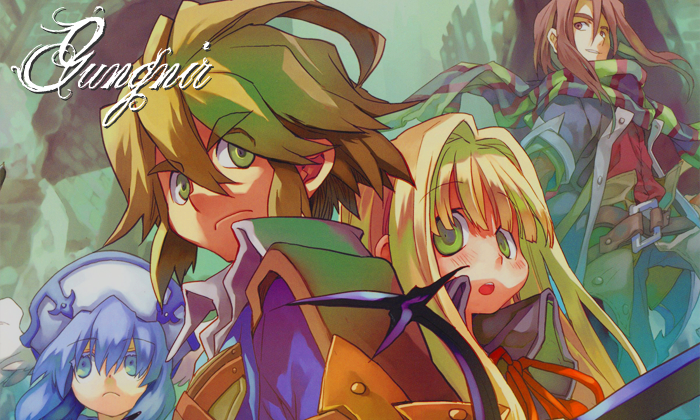
Gungnir is Episode IX of Dept. Heaven. It was released for the PSP in 2011. Kiyudzuki Satoko reprises her role as art director and character designer, while Iwanaga Yoshinori returns as the designer of the eponymous Inferno.
The Story
The year is 983. Welcome to the Empire of Gargandia.
Gargandia is a country divided, both spiritually and literally. It is home to two races: The indigenous Daltania, who form the nobility, and the immigrant Leonica, who lack citizenship rights and are forced to live in run-down ghettoes due to the prejudice of the Daltania. According to the star-worshipping religion practiced in Gargandia, the Leonica are a cursed people who will eventually give birth to the harbinger of the apocalypse.
The ghettoes are not solely populated by the Leonica-members of other unwelcome races are forced to live there, and such towns are a common place of exile for disgraced Daltania and people who have lost their citizenship.
One such ghetto, Espada, is home to a resistance movement called Esperanza. These rebels had once hoped to strike back against the Imperial rule, but after the loss of their leader Ricard Raguel in the Espada Massacre 15 years ago, they were reduced to acts of small-scale terrorism. But now, led by Ricard’s adopted son Ragnus, revolution is about to boil over once again.
Julio Raguel, Ricard’s youngest child, is a fellow member of Esperanza. One day during a mission, he rescues a Daltania girl named Alyssa from slavers and brings her back to Espada to live with Esperanza. However, his act of kindness will inevitably bring the wrath of the Imperial Army down upon his people.
In the desperate battle that results, Julio is about to face death when he is granted a mysterious lance and great power in a strange encounter with the self-proclaimed angelic messenger Elise. Armed with Gungnir, Julio finds himself made Esperanza’s trump card, and the revolution begins.
Gungnir takes the themes of prejudice, discrimination, injustice, and racial discord that have run throughout the Dept. Heaven series and shouts them from the hilltops. This is a story filled with harsh social commentary, struggling against terrible odds, and the kinds of battles that are played out in human history over and over again without end.
The Characters
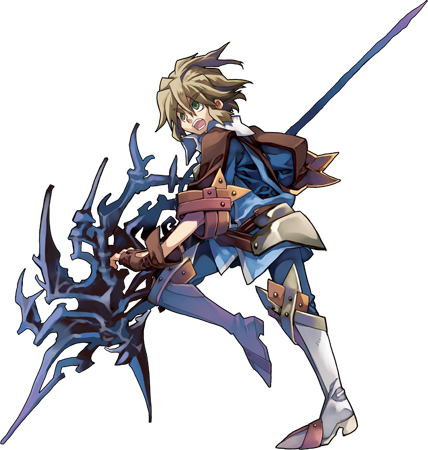
Julio Raguel / Giulio is our hero, a young Leonica boy born and raised in the slums of Espada. He was born on the day of the Espada Massacre, and as the son of the hero Ricard he has some very tall boots to fill. Despite his strength and tall stature, he’s still very much a child. Loves his big brother and sister deeply, and relies on Ragnus quite a bit.
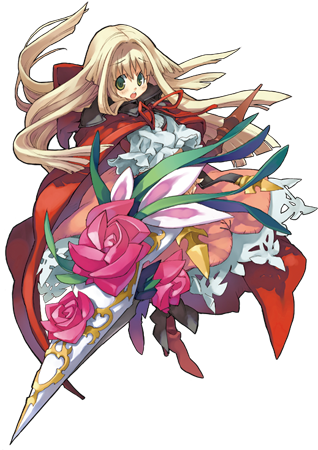
Alyssa / Alissa is the heroine of the story. She is thought to be a Daltania noble, but won’t talk about where she’s actually from or why she was kidnapped. She tends to come off as quite hesitant and timid, but once provoked she is a fierce and valiant fighter who will stubbornly see her ideals through to the bitter end. Loves birds, and has a pet great eagle named Ilya.
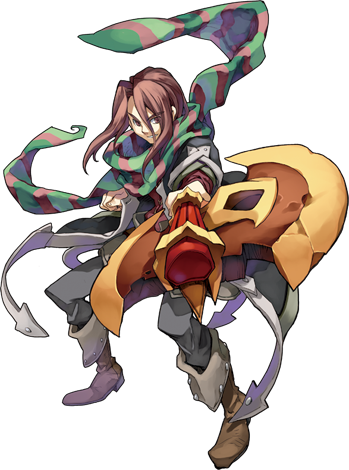
Ragnus Raguel is Julio’s adoptive big brother, the captain of Esperanza. He has lived in Espada from a young age, but has been an outcast all his life due to his Daltania heritage. He tries to act calm to be a good leader, but is actually quite emotional and carries a number of insecurities. Loves Julio and is very supportive of him.
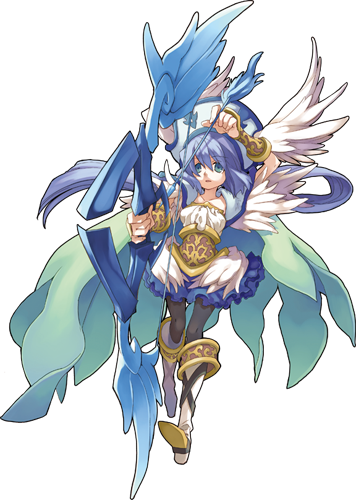
Elise is the self-proclaimed Spinner of Gungnir, and calls herself an angel from Asgard. Has an extremely brusque personality and is a bit on the lazy side, disinterested in everything other than Julio and Gungnir itself. Loves kokori nuts, dismisses human courtesy, and likes to enquire as to the state of Julio’s boner (or lack thereof). Gets along unexpectedly(?) well with Alyssa.
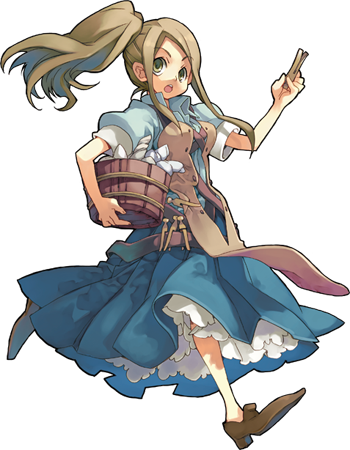
Fiona Raguel is Julio’s blood-related big sister. Unlike her brothers, she is not a fighter; instead she is the poster girl and owner of the most popular pub in Espada. Has an upbeat personality and always speaks her mind; enjoys and is good at cooking. Due to being an orphan she’s fiercely protective of her friends and family, especially Julio.
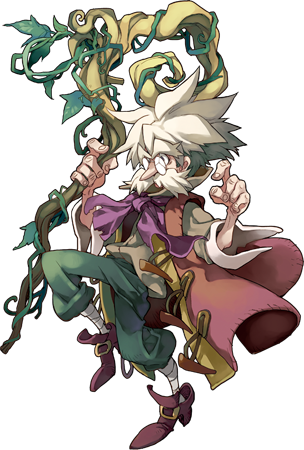
Paulo is an elderly Daltania man who has lived in Espada since shortly before the massacre 15 years ago, and was friends with Ricard. He acts as surrogate father to the three Raguel siblings and is Esperanza’s tactician. Plays at being a kindly old man, but underneath he’s just as smart and ruthless as he ever was. Good at alchemy. Loves alcohol and pretty girls.
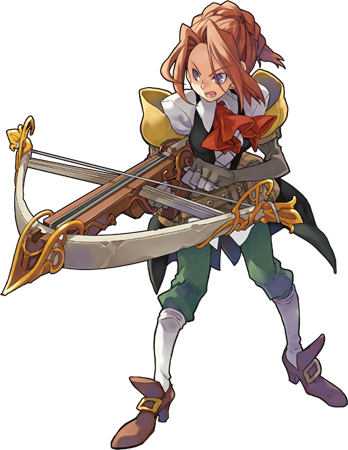
Valery Brigid / Valerie is a young Daltania woman and one of the survivors of the radical Republican movement. Blunt, brutally honest, and shrewd. Really doesn’t think much of the monarchy. If anybody needs a calling-out for hypocrisy or for social justice-related fail, she’s your girl. Used to love meat, but stopped being able to eat it after being exposed to battle.
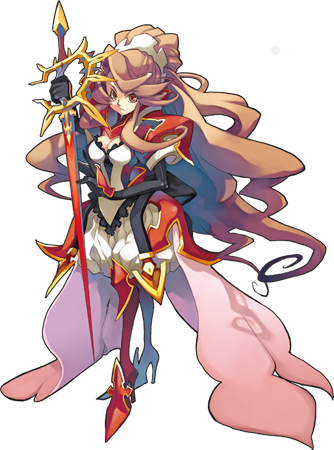
Natalia Raymond is a youthful Gargandian knight. A genius fencer who got her first medal of service at age 14. Proud, upright, and has a strong sense of justice that many knights lack. Not unsympathetic to the plight of the Leonica, but is definitely more worried about external threats to the empire. Loves sweets.
The Format
Gungnir is a turn-based SRPG that plays deceptively similarly to games like Final Fantasy Tactics and Tactics Ogre at first glance. You deploy your characters, and during your turn you can take action with any one of them to attack the enemy or otherwise fulfill your objective.
What makes Gungnir stand out is the Tactics Gauge system. As you move your characters around the map, the gauge will slowly fill up with points, and by capturing flags all around the area the gauge’s capacity will increase. You can spend the points on a number of different things-two types of combo attacks known as Boost (all allies aligned with the attacker pump them up for a single super-strong attack) and Beat (all allies aligned with the enemy attack in turns), interrupting the turn order to move whoever you please right away, and summoning the Inferno.
There are five Inferno, which Julio becomes able to summon over the course of the game. Each one has different effects-some attack physically, some inflict status ailments, some heal characters. The problem is that you can’t influence what they decide to target (you only get to check to see what they’ll hit before you use them). It’s up to you to decide whether or not the risk is worth it.
Another interesting aspect of the game is that levels have very little meaning. By leveling up, characters’ stats will increase very slightly, as will their carrying capacity-and their carrying capacity is all that really matters, because your party’s abilities will come mostly from their equipment. This is the first Dept. Heaven game that has traditional inventories for characters. They can equip up to five things-up to two weapons, one piece of armor per body part, and extraneous comestibles. Items have weight, and generally the heavier things are the stronger they are, so the only major advantage a level 50 soldier has over a level 1 soldier is that the former can carry a bit more, and can thus equip the cool things. Since most new units will arrive in your army at a pretty low level, this comes in handy-you can just have them run around with someone else’s hand-me-downs for a map or two, and then they’ll be all caught up and capable of handling heavy artillery.
Like Yggdra Union (et cetera) and Knights in the Nightmare, Gungnir’s maps are told in the format of story scene, combat, story scene. You’ll be able to save and visit the facilities of the town you’re in after each map ends, allowing you to buy items, recruit new hopefuls, or hire mercenaries. You can also have your alchemist teammate Paulo temper your items if you collect gems around maps.
Each map requires you to choose an Ace from amongst your soldiers-who amongst the story characters is available differs by map. Each Ace lends special bonuses to certain classes, so you have an extra incentive to try out all your generics and find out what tactics work for you.
Finally, you’ll run into choice points every now and again during story scenes. What you have Julio choose to do will have an impact on the story, certain battles, and which ending you receive.
There are multiple difficulty levels, which must be unlocked as in Knights in the Nightmare. Too, there is a New Game Plus function, which allows you to inherit the items and gems you were carrying when you beat the game.
Extra Materials
Gungnir Official Documents Book - Contains art, characters’ background settings, production notes, and an interview with the staff.
The masterpost can be found here!
Warning: This post is image-heavy.
Gungnir is Episode IX of Dept. Heaven. It was released for the PSP in 2011. Kiyudzuki Satoko reprises her role as art director and character designer, while Iwanaga Yoshinori returns as the designer of the eponymous Inferno.
The Story
The year is 983. Welcome to the Empire of Gargandia.
Gargandia is a country divided, both spiritually and literally. It is home to two races: The indigenous Daltania, who form the nobility, and the immigrant Leonica, who lack citizenship rights and are forced to live in run-down ghettoes due to the prejudice of the Daltania. According to the star-worshipping religion practiced in Gargandia, the Leonica are a cursed people who will eventually give birth to the harbinger of the apocalypse.
The ghettoes are not solely populated by the Leonica-members of other unwelcome races are forced to live there, and such towns are a common place of exile for disgraced Daltania and people who have lost their citizenship.
One such ghetto, Espada, is home to a resistance movement called Esperanza. These rebels had once hoped to strike back against the Imperial rule, but after the loss of their leader Ricard Raguel in the Espada Massacre 15 years ago, they were reduced to acts of small-scale terrorism. But now, led by Ricard’s adopted son Ragnus, revolution is about to boil over once again.
Julio Raguel, Ricard’s youngest child, is a fellow member of Esperanza. One day during a mission, he rescues a Daltania girl named Alyssa from slavers and brings her back to Espada to live with Esperanza. However, his act of kindness will inevitably bring the wrath of the Imperial Army down upon his people.
In the desperate battle that results, Julio is about to face death when he is granted a mysterious lance and great power in a strange encounter with the self-proclaimed angelic messenger Elise. Armed with Gungnir, Julio finds himself made Esperanza’s trump card, and the revolution begins.
Gungnir takes the themes of prejudice, discrimination, injustice, and racial discord that have run throughout the Dept. Heaven series and shouts them from the hilltops. This is a story filled with harsh social commentary, struggling against terrible odds, and the kinds of battles that are played out in human history over and over again without end.
The Characters
Julio Raguel / Giulio is our hero, a young Leonica boy born and raised in the slums of Espada. He was born on the day of the Espada Massacre, and as the son of the hero Ricard he has some very tall boots to fill. Despite his strength and tall stature, he’s still very much a child. Loves his big brother and sister deeply, and relies on Ragnus quite a bit.
Alyssa / Alissa is the heroine of the story. She is thought to be a Daltania noble, but won’t talk about where she’s actually from or why she was kidnapped. She tends to come off as quite hesitant and timid, but once provoked she is a fierce and valiant fighter who will stubbornly see her ideals through to the bitter end. Loves birds, and has a pet great eagle named Ilya.
Ragnus Raguel is Julio’s adoptive big brother, the captain of Esperanza. He has lived in Espada from a young age, but has been an outcast all his life due to his Daltania heritage. He tries to act calm to be a good leader, but is actually quite emotional and carries a number of insecurities. Loves Julio and is very supportive of him.
Elise is the self-proclaimed Spinner of Gungnir, and calls herself an angel from Asgard. Has an extremely brusque personality and is a bit on the lazy side, disinterested in everything other than Julio and Gungnir itself. Loves kokori nuts, dismisses human courtesy, and likes to enquire as to the state of Julio’s boner (or lack thereof). Gets along unexpectedly(?) well with Alyssa.
Fiona Raguel is Julio’s blood-related big sister. Unlike her brothers, she is not a fighter; instead she is the poster girl and owner of the most popular pub in Espada. Has an upbeat personality and always speaks her mind; enjoys and is good at cooking. Due to being an orphan she’s fiercely protective of her friends and family, especially Julio.
Paulo is an elderly Daltania man who has lived in Espada since shortly before the massacre 15 years ago, and was friends with Ricard. He acts as surrogate father to the three Raguel siblings and is Esperanza’s tactician. Plays at being a kindly old man, but underneath he’s just as smart and ruthless as he ever was. Good at alchemy. Loves alcohol and pretty girls.
Valery Brigid / Valerie is a young Daltania woman and one of the survivors of the radical Republican movement. Blunt, brutally honest, and shrewd. Really doesn’t think much of the monarchy. If anybody needs a calling-out for hypocrisy or for social justice-related fail, she’s your girl. Used to love meat, but stopped being able to eat it after being exposed to battle.
Natalia Raymond is a youthful Gargandian knight. A genius fencer who got her first medal of service at age 14. Proud, upright, and has a strong sense of justice that many knights lack. Not unsympathetic to the plight of the Leonica, but is definitely more worried about external threats to the empire. Loves sweets.
The Format
Gungnir is a turn-based SRPG that plays deceptively similarly to games like Final Fantasy Tactics and Tactics Ogre at first glance. You deploy your characters, and during your turn you can take action with any one of them to attack the enemy or otherwise fulfill your objective.
What makes Gungnir stand out is the Tactics Gauge system. As you move your characters around the map, the gauge will slowly fill up with points, and by capturing flags all around the area the gauge’s capacity will increase. You can spend the points on a number of different things-two types of combo attacks known as Boost (all allies aligned with the attacker pump them up for a single super-strong attack) and Beat (all allies aligned with the enemy attack in turns), interrupting the turn order to move whoever you please right away, and summoning the Inferno.
There are five Inferno, which Julio becomes able to summon over the course of the game. Each one has different effects-some attack physically, some inflict status ailments, some heal characters. The problem is that you can’t influence what they decide to target (you only get to check to see what they’ll hit before you use them). It’s up to you to decide whether or not the risk is worth it.
Another interesting aspect of the game is that levels have very little meaning. By leveling up, characters’ stats will increase very slightly, as will their carrying capacity-and their carrying capacity is all that really matters, because your party’s abilities will come mostly from their equipment. This is the first Dept. Heaven game that has traditional inventories for characters. They can equip up to five things-up to two weapons, one piece of armor per body part, and extraneous comestibles. Items have weight, and generally the heavier things are the stronger they are, so the only major advantage a level 50 soldier has over a level 1 soldier is that the former can carry a bit more, and can thus equip the cool things. Since most new units will arrive in your army at a pretty low level, this comes in handy-you can just have them run around with someone else’s hand-me-downs for a map or two, and then they’ll be all caught up and capable of handling heavy artillery.
Like Yggdra Union (et cetera) and Knights in the Nightmare, Gungnir’s maps are told in the format of story scene, combat, story scene. You’ll be able to save and visit the facilities of the town you’re in after each map ends, allowing you to buy items, recruit new hopefuls, or hire mercenaries. You can also have your alchemist teammate Paulo temper your items if you collect gems around maps.
Each map requires you to choose an Ace from amongst your soldiers-who amongst the story characters is available differs by map. Each Ace lends special bonuses to certain classes, so you have an extra incentive to try out all your generics and find out what tactics work for you.
Finally, you’ll run into choice points every now and again during story scenes. What you have Julio choose to do will have an impact on the story, certain battles, and which ending you receive.
There are multiple difficulty levels, which must be unlocked as in Knights in the Nightmare. Too, there is a New Game Plus function, which allows you to inherit the items and gems you were carrying when you beat the game.
Extra Materials
Gungnir Official Documents Book - Contains art, characters’ background settings, production notes, and an interview with the staff.